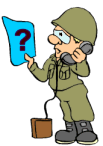
Let's go!


Questions?
These questions on the previous page are 'simple questions' because they only allow the answers 'yes' or 'no'. To obtain more information, we need to use question words. Question words are the first word of a question, and are followed by the rest of the question. The grammar and word order of the question are the same as for a simple question.
For example:
Are you happy? can be answered by 'yes' or 'no'
but Why are you happy? is asking for a reason.
Other question words are:
Sometimes we only need to ask the question word, though it is more polite to make a complete sentence.
For example:
Jake is having a party.
When?
Just solve that problem
How?
(Remember you can also use 'what?' so show that you did not hear what was said, but again, it is not a very polite usage.)
You can also ask for more information about a part of a statement by repeating the words you would like more information about.
For example:
Robert's taking his mother in his car.
His mother?
Yes, she is staying with him this week.
Robert's taking his mother in his car.
His car?
Didn't you know? He's got a new car.
These are used to keep a conversation going. You reply to question tags with 'Yes' or 'no'. To form a question tag, you use the auxiliary, modal or the verb 'to be' in the main sentence, and follow it with the subject pronoun. If the main statement is positive, the question tag should be negative, and if the statement is positive, the question tag is negative.
For example:
Question tags are really easy, aren't they?
'Question tags' is the subject, and the sentence uses the verb 'to be'. Because the subject is a plural noun, the subject pronoun is 'they' and because the verb 'to be' is the present simple plural form 'are' the question tag is aren't followed by 'they'.
These are questions that the speaker does not really expect to be answered. They are used to make the speech more dramatic, and to get the listener's attention.
For example:
Guess what? Sally phoned! The speaker does not give time for you to guess the 'guess what' just means 'Interesting news!'
Do you think I'm an idiot? Of course I knew that! This is a forceful way to say 'I would be stupid if I did not know that.'
Multiple part questions are when there are several different kinds of information that you want, so you ask for all the information in a single question.
For example:
Who are you and what do you want?
or
When did he come and why didn't you call me?
You can see that each question is really two separate questions joined by the linking word 'and'. Therefore each part has the normal grammar of a direct question.
These are statements, usually of two clauses that include a question word, but which are not really questions. Because they are not questions, you should not construct them using the grammar of questions.
For example:
I don't know where I was that day.
If this was a question, the second clause would be 'Where was I that day?', but because it is a statement 'was' and 'I' are not changed around, and there is no question mark.
So do you understand questions? They are easy, aren't they? Would you like to try some exercises next? But why am I asking? Of course you would, wouldn't you?